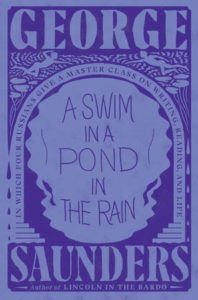George Saunders is the #1 New York Times bestselling author of ten books, including Lincoln in the Bardo, which won the Man Booker Prize; Congratulations, by the way; Tenth of December, a finalist for the National Book Award; The Braindead Megaphone; and the critically acclaimed short story collections CivilWarLand in Bad Decline, Pastoralia, and In Persuasion Nation. He teaches in the creative writing program at Syracuse University. His newest book A Swim in a Pond in the Rain is on sale January 2021.
*
Lit Hub: Who do you most wish would read your book? (your boss, your childhood bully, Michelle Obama, etc.)
George Saunders: This book, I wrote for other writers and teachers of writing and for serious readers. I hope it offers something to those people in particular. But, honestly, I’ll take anybody I can get. Ha ha, and yet not: I like the idea that I might convert a few people who don’t consider themselves fans of the short story, by showing them that it’s actually a simple, beautiful, accessible form, that will speak to them every day. Also, I wish Tolstoy could read it. I expect he’d object to it but it would be fun to get in an argument with him.
LH: What do you always want to talk about in interviews but never get to?
GS: I’ve had really good luck with interviewers and have usually found that we can work our way into the things that I’m finding interesting (and hopefully that they’re interested in too.) I usually like to talk about process stuff—how the book or story came to be written. A lot of interviews start with some question about why a writer did this or that but, since my approach is to try to have very little intention at the outset, I try to be honest about that and dodge the “why” questions, in favor of the “how” questions.
LH: What time of day do you write?
GS: On an ideal day, I start in the morning and work into the early afternoon. But I can pretty much sit down and concentrate whenever the opportunity presents itself.
LH: How do you tackle writer’s block?
GS: I think if a writer is a reviser, there’s no such thing. That is, if I feel stuck, I just start typing, in the confidence that I can fix it later, and that “fixing it” is actually what 90 percent of writing is (for me, anyway).
LH: Which book(s) do you return to again and again?
GS: Gogol’s Dead Souls, the short stories of Isaac Babel and Flannery O’Connor. Lately I have a project of reading the sort of lesser known Shakespeare plays.
LH: Which non-literary piece of culture—film, tv show, painting, song—could you not imagine your life without?
GS: There’s a group of songs and compositions that would qualify: a few things by Copland, “The New World Symphony” by Dvorak, “Kinda Blue,” by Miles Davis, a bunch of songs by Wilco, Sleater-Kinney, Jason Isbell, Springsteen, Leo Kottke. And “Partita for Eight Voices,” by Caroline Shaw, Harvest by Neil Young, Lemonade, by Beyonce—well, that’s just the start of a long list. I also think a lot about the photographs of Joel Sternfeld, and “The Americans” by Robert Frank and the film version of The Grapes of Wrath. Any and everything by Monty Python. Steve Martin’s stand-up. And. . . I’ll stop there, lest I recite the entire contents of the Library of Congress.
LH: What’s the best writing advice you’ve ever received?
GS: It was from my teacher Tobias Wollf: “Don’t lose the magic.” What this means to me now is, the first job of an artist is to delight the audience and she might not get to choose how she does that—it has to do with who she is. That’s basically the writer’s life work, to find out how he or she is delightful on the page.
LH: What was the first book you fell in love with?
GS: Well, I always say Johnny Tremaine, and I think that’s true, but I also remember having a really deep feeling about a handful of those Little Golden Books—the way the art and the story worked together and the wild colors and the sense of compression and cartoonishness that actually made the stories seem more real, rather than less. Also, my aunts used to read them to me at my grandparents’ house and I expect I felt the love in that, which is maybe why I remember those books so fondly.
LH: Name a classic you feel guilty about never having read?
GS: I’ve never read Proust’s In Search of Lost Time or any of its component parts. I haven’t read it, I think, because I expect it would make me want to write about my life, which I don’t really want to do, because I suspect it might stink. The details of my life don’t seem as interesting to me as the prospect of inventing hyper-dramatic fictional situations, and I’m afraid that Proust might change my mind on that.
LH: Is there a book you wish you had written?
GS: There are so many. But at the moment, I really wish I had written some of those classic Dr. Seuss books—they are so elemental and joyful and peculiar and elegant. And simple—it is really hard to write something so simple, that it feels only you could have written and that continues to speak to people over the years. That’s a gift. They also feel so good-hearted—just little nonsensical celebrations that, because they are so celebratory, actually make perfect sense.
__________________________________

A Swim in a Pond in the Rain by George Saunders is available now via Random House.
